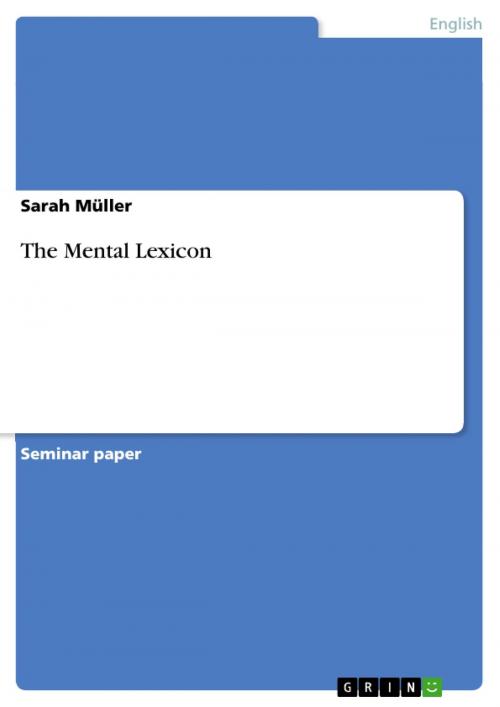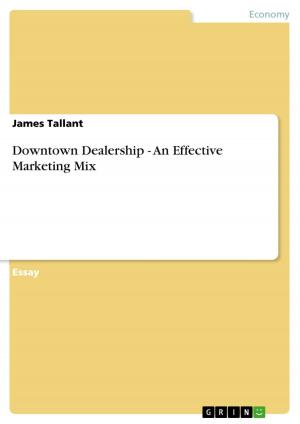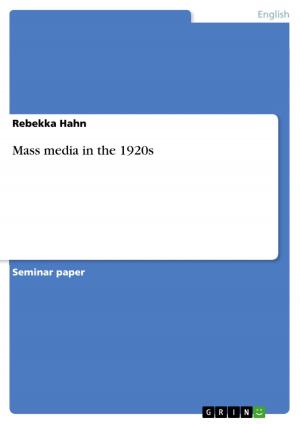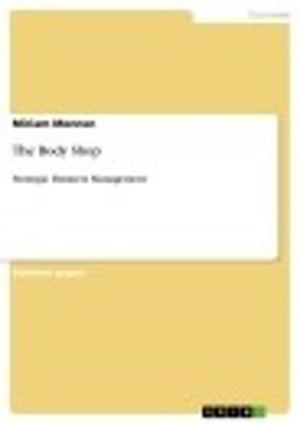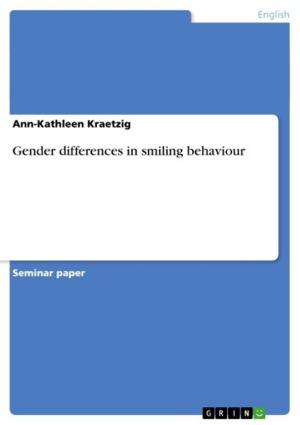| Author: | Sarah Müller | ISBN: | 9783638050241 |
| Publisher: | GRIN Publishing | Publication: | May 20, 2008 |
| Imprint: | GRIN Publishing | Language: | English |
| Author: | Sarah Müller |
| ISBN: | 9783638050241 |
| Publisher: | GRIN Publishing |
| Publication: | May 20, 2008 |
| Imprint: | GRIN Publishing |
| Language: | English |
Seminar paper from the year 2007 in the subject English Language and Literature Studies - Linguistics, grade: 2, University of Frankfurt (Main), 11 entries in the bibliography, language: English, abstract: Das mentale Lexikon wird in dieser Arbeit mit seinen verschiedenen Aspekten dargestellt. Unterschiedliche Theorieansätze werden vorgestellt, u. a. von Aitchison. 1. Introduction [...] Aitchison (2003:6) refers to a study by Seashore and Eckerson (1940) in which they estimated that an educated adult knows more than 58,000 common 'basic words', 1,700 rare 'basic words' and 96,000 derivates and compounds. This is an overall total of 150,000 words of which 90% are used actively. Aitchison (2003:6-7) argues that 'this figure is controversial, because of the problems of defining 'word' and the difficulty of finding a reliable procedure for assessing vocabulary knowledge'. Rothweiler (2001:21) refers to Miller (1993) who estimates the vocabulary of an average educated adult at 80,000 words. Rothweiler (2001:21) argues that the mental lexicon is more than a passive memory. She refers to Levelt (1989:181) that the lexicon is a central station between conceptualization on the one hand and the grammatical and phonological coding of language on the other hand. Both the acquisition of words and the usage of words refer to lexical processes. The lexicon seems to be well structured because words can be located in a split second (Aitchison 2003:7). Both Rothweiler and Aitchison refer to confirmed experiments that native speakers can recognize a word of their mother tongue in 200 ms or less from its onset and can reject a non-word sound sequence in about half a second. Production of a word is slightly slower: the lexicon is able to generate up to six syllables a second, 'making three or more words [...] fairly standard' (Aitchison 2003:8). Errors of selection are rare - one in about a thousand words. This paper is about the mental lexicon. First, I will compare the mental lexicon to a dictionary and come to the conclusion that it differs radically from a dictionary in terms of organization and content. Second, I will focus on 'words', what they are and whether they have a fixed meaning. I will outline Rosch's prototype theory and sense relations. Third, I will come to lexical processing and describe two processing models: the serial-autonomous models and the parallel-interactive models. My last chapter will be an overview on early language acquisition and constraints on word meaning.
Seminar paper from the year 2007 in the subject English Language and Literature Studies - Linguistics, grade: 2, University of Frankfurt (Main), 11 entries in the bibliography, language: English, abstract: Das mentale Lexikon wird in dieser Arbeit mit seinen verschiedenen Aspekten dargestellt. Unterschiedliche Theorieansätze werden vorgestellt, u. a. von Aitchison. 1. Introduction [...] Aitchison (2003:6) refers to a study by Seashore and Eckerson (1940) in which they estimated that an educated adult knows more than 58,000 common 'basic words', 1,700 rare 'basic words' and 96,000 derivates and compounds. This is an overall total of 150,000 words of which 90% are used actively. Aitchison (2003:6-7) argues that 'this figure is controversial, because of the problems of defining 'word' and the difficulty of finding a reliable procedure for assessing vocabulary knowledge'. Rothweiler (2001:21) refers to Miller (1993) who estimates the vocabulary of an average educated adult at 80,000 words. Rothweiler (2001:21) argues that the mental lexicon is more than a passive memory. She refers to Levelt (1989:181) that the lexicon is a central station between conceptualization on the one hand and the grammatical and phonological coding of language on the other hand. Both the acquisition of words and the usage of words refer to lexical processes. The lexicon seems to be well structured because words can be located in a split second (Aitchison 2003:7). Both Rothweiler and Aitchison refer to confirmed experiments that native speakers can recognize a word of their mother tongue in 200 ms or less from its onset and can reject a non-word sound sequence in about half a second. Production of a word is slightly slower: the lexicon is able to generate up to six syllables a second, 'making three or more words [...] fairly standard' (Aitchison 2003:8). Errors of selection are rare - one in about a thousand words. This paper is about the mental lexicon. First, I will compare the mental lexicon to a dictionary and come to the conclusion that it differs radically from a dictionary in terms of organization and content. Second, I will focus on 'words', what they are and whether they have a fixed meaning. I will outline Rosch's prototype theory and sense relations. Third, I will come to lexical processing and describe two processing models: the serial-autonomous models and the parallel-interactive models. My last chapter will be an overview on early language acquisition and constraints on word meaning.
